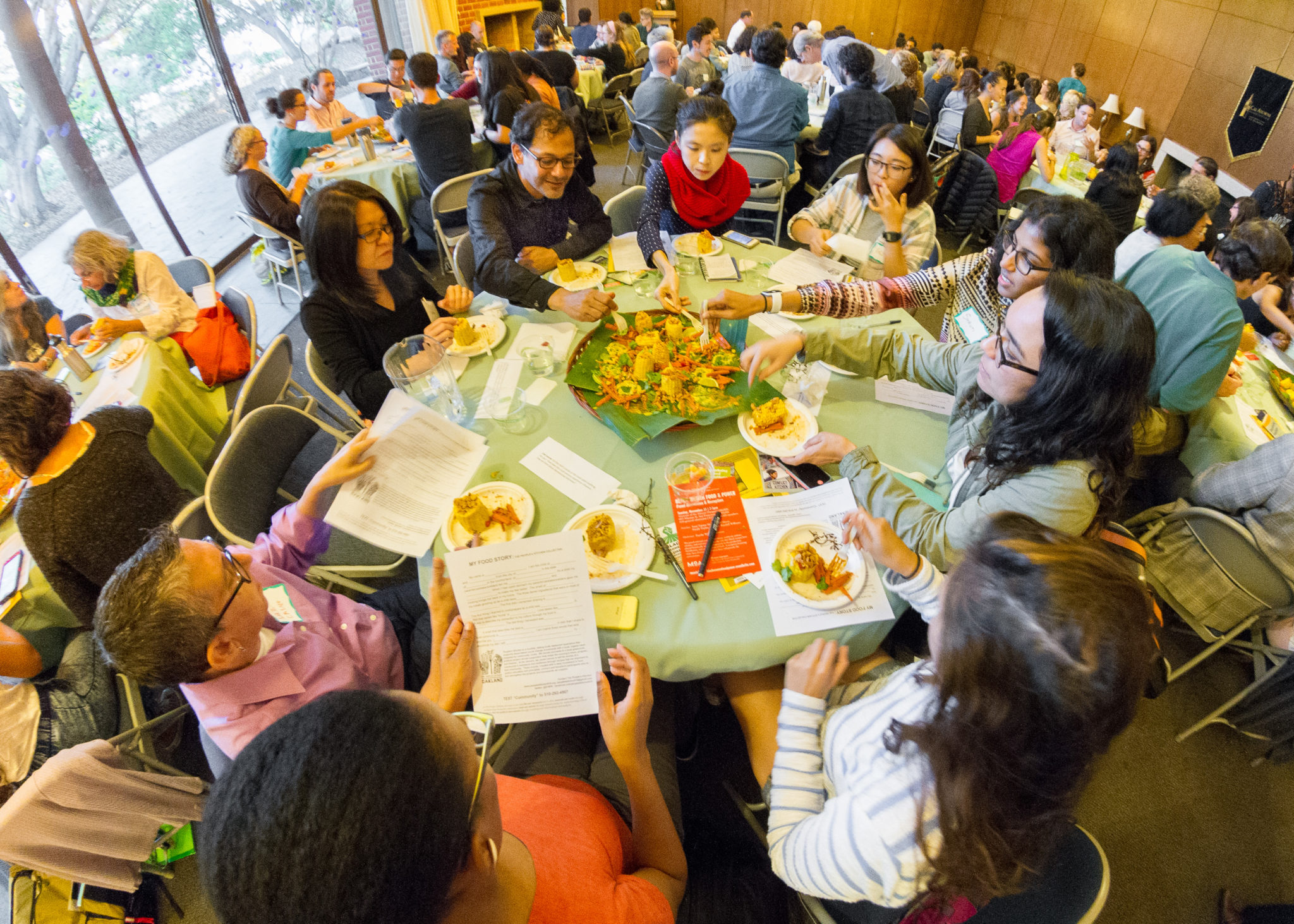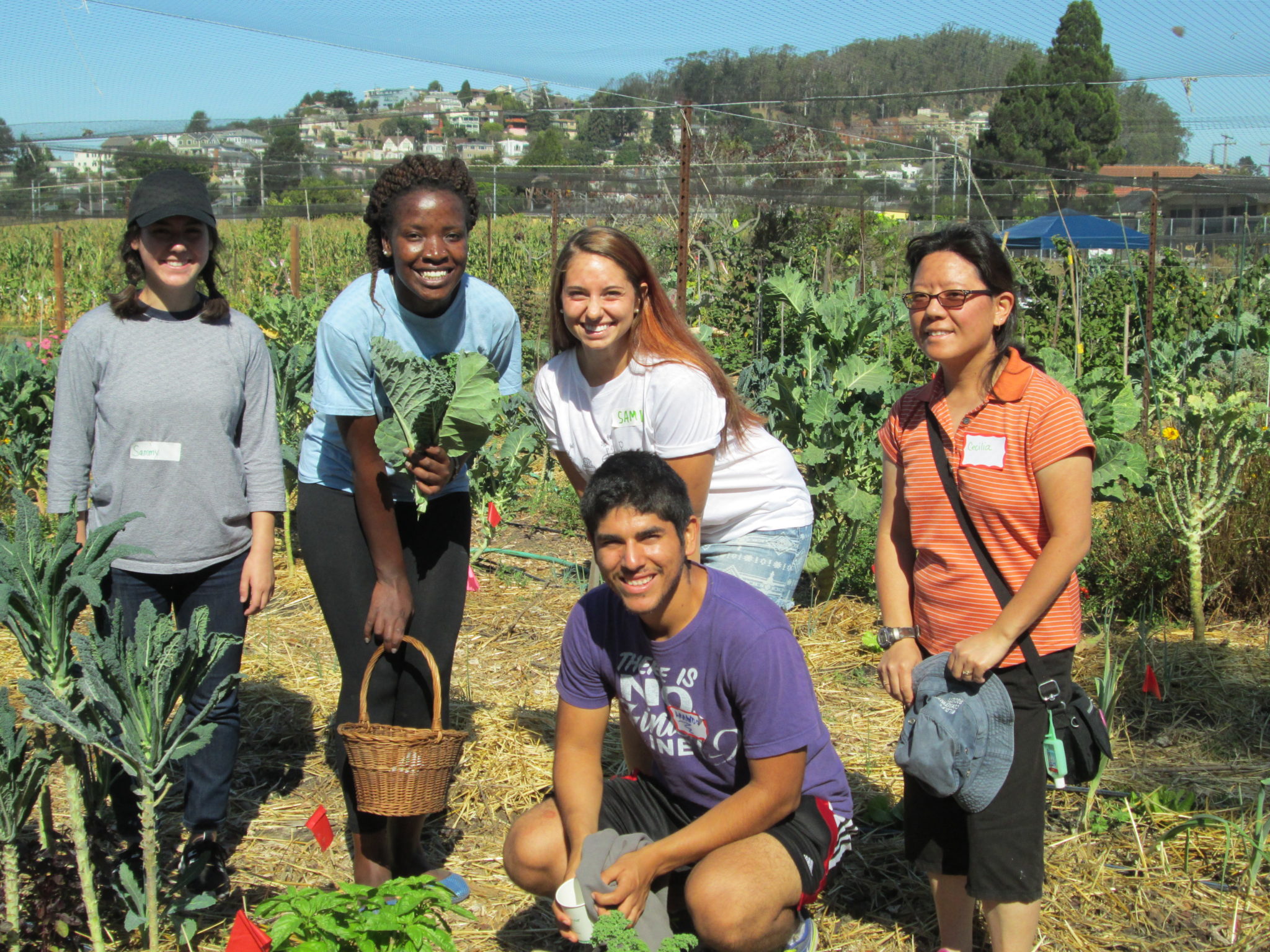
Photo Credit: Jim Block
January 23, 2017
By Ann Thrupp, Berkeley Food Institute Executive Director
This blog post originally appeared in the UC Food Observer on January 19, 2017.
Over the past three years, I have been continually inspired by the remarkable level of student enthusiasm about education and activism tied to sustainable agriculture and food systems. At the UC campuses, along with many other universities and colleges across the country, student fascination and engagement in food systems have clearly escalated. Responding to students’ hunger for opportunities and problem solving, higher ed institutions have expanded educational opportunities, degree programs, student gardens and farms and developed new initiatives in food procurement, nutrition, food security and more.
Thirty-five years ago, when I was an undergraduate student, there were virtually no formal study opportunities and extremely limited practical training opportunities for young people interested in sustainable agriculture. I designed my own double-major in Human Biology and Latin American Studies, emphasizing ecological agriculture alongside rural development and food security. After I graduated and was seeking an interdisciplinary opportunity on sustainable agriculture for graduate school, I couldn’t find any programs in the entire US, and only three or four outside the US that came close to the opportunities available today.
Today, there are approximately 400 education and training programs offered across the country that address sustainable agriculture and agroecology. At least 50 university and colleges nationwide also have student farms or gardens that enable hands-on education and research. Of course, many universities have provided specialized agriculture and food programs for many decades, but what is exciting and novel is the upsurge of multi-disciplinary, systemic approaches with greater attention to sustainability and equity.

Students and faculty share a meal at the Decolonizing Foodways event. Photo by Jonathan Fong.
Through my work at the Berkeley Food Institute, I see students involved in an enormous diversity of activities in this space, such as campus gardens and the food retail collective, cutting-edge research on food and agriculture innovations, food justice activism, creative entrepreneurship programs, food procurement services, policy-related advocacy, and nutrition counseling. Student–led clubs and affiliated groups related to food systems continue to sprout spontaneously. We have seen more job opportunities popping up, and, concomitantly, more competition for jobs. From our own experience, we receive an astounding number of applicants for jobs we offer, and we hear the same from colleagues in both the public and private sector. This good food energy is mushrooming at UC Berkeley—and is illustrative of a broader movement nationwide.
What is contributing to this trend? Where is this “food movement” among the younger generation heading? Can this wave of enthusiastic learning and passion help solve heavily entrenched social, environmental and political challenges in the dominant food and agriculture systems – from local to global levels?
Why is the food movement growing?
One crucial factor behind the growing interest in food is the realization that food systems strongly influence so many essential factors in our society—including health and well-being, economics and business interests, environment and natural resources, and government and jobs. Likewise, food systems issues intersect with critical social challenges of our time—including persistent hunger and poverty, obesity and diabetes, climate change and environmental degradation, labor exploitation and extreme concentration of capital. Accordingly, people connect to food issues from many vantage points and interests.
More fundamentally, food brings people together because all people depend on food for survival. Food brings people together not only for socializing, conviviality and enjoying tastes, but also to develop collective solutions to our most pressing challenges.
I asked Agnes Zhu, a UC Berkeley undergrad and Global Food Initiative Fellow, what she sees driving the good food movement’s growth among her peers. She responded:
“In a world that seems to be getting more divided, food is something that never fails to bring people together. Food has always been an essential part of all our lives, but only recently have we begun to recognize, discuss and investigate its role in our society. Today, more and more young people are beginning to not only reflect on the important role food plays in their personal lives—culturally, nutritionally and socially—but also its extreme relevance to their future professions, hobbies and every aspect of the very world they inhabit.”
It is also clear that popular media and social trends have stimulated consumers to pay attention to food issues. Growing consumer concerns about health connections to nutrition, where food comes from and how it is grown, the added ingredients and chemicals in processed food products, and the control of the food industry are interconnected with the growth of the young leadership movement in food. Another factor is the growth of new jobs in food systems that did not exist before, opening up different career opportunities through entrepreneurship and tech applications in food and agriculture, and also social services, policy and education in food systems.
What is the potential of this growth?

Students at the UC Gill Tract Community Farm. Photo by Jennifer Sowerwine.
During a time when agroecology and food justice are not likely to receive the support they require from our federal government, we can find hope in the large number of young leaders who are digging deep and committing to these ideals. It is important to support these emerging leaders by creating and expanding opportunities—opportunities for training, to access land to farm, to engage in public policies that will support the future of farming and to develop the leadership skills needed to carry the good food movement forward. It is critical that these opportunities are equitable and inclusive. Educators, researchers and society at large will benefit from harnessing the enthusiasm of young leaders and supporting their empowerment.
This new generation will help move agriculture to a more systemic, inter-connected approach to food. The US has an aging farmer population, facing a need to transition in new stewards of the land. While growing consolidation is pushing out small family farms, there could be exciting opportunities for young farmers to resist this consolidation and step in and lead a new wave of agriculture—agriculture that is more aligned than ever before with social, health and environmental interests. Schooled in multi-disciplinary food systems, the emerging leaders I have met and am so fortunate to work with provide heaps of hope for the future of farming, food and social justice in this country, and we will continue to work alongside them to support their development and success.